- Details
- Written by: Kamran Mofid
- Hits: 954

Lest We Forget
"In days long gone, in those halcyon days, the entire nation would sit down with bottles of stout and plates of dripping to watch a programme in which an enthusiastically cigarette-smoking Bertrand Russell, or someone of similar super-intelligence, sat motionless in a chair and discussed for hours the finer points of philosophy in incredible detail with an equally un-televisual man.”…Where have all the thinkers gone?
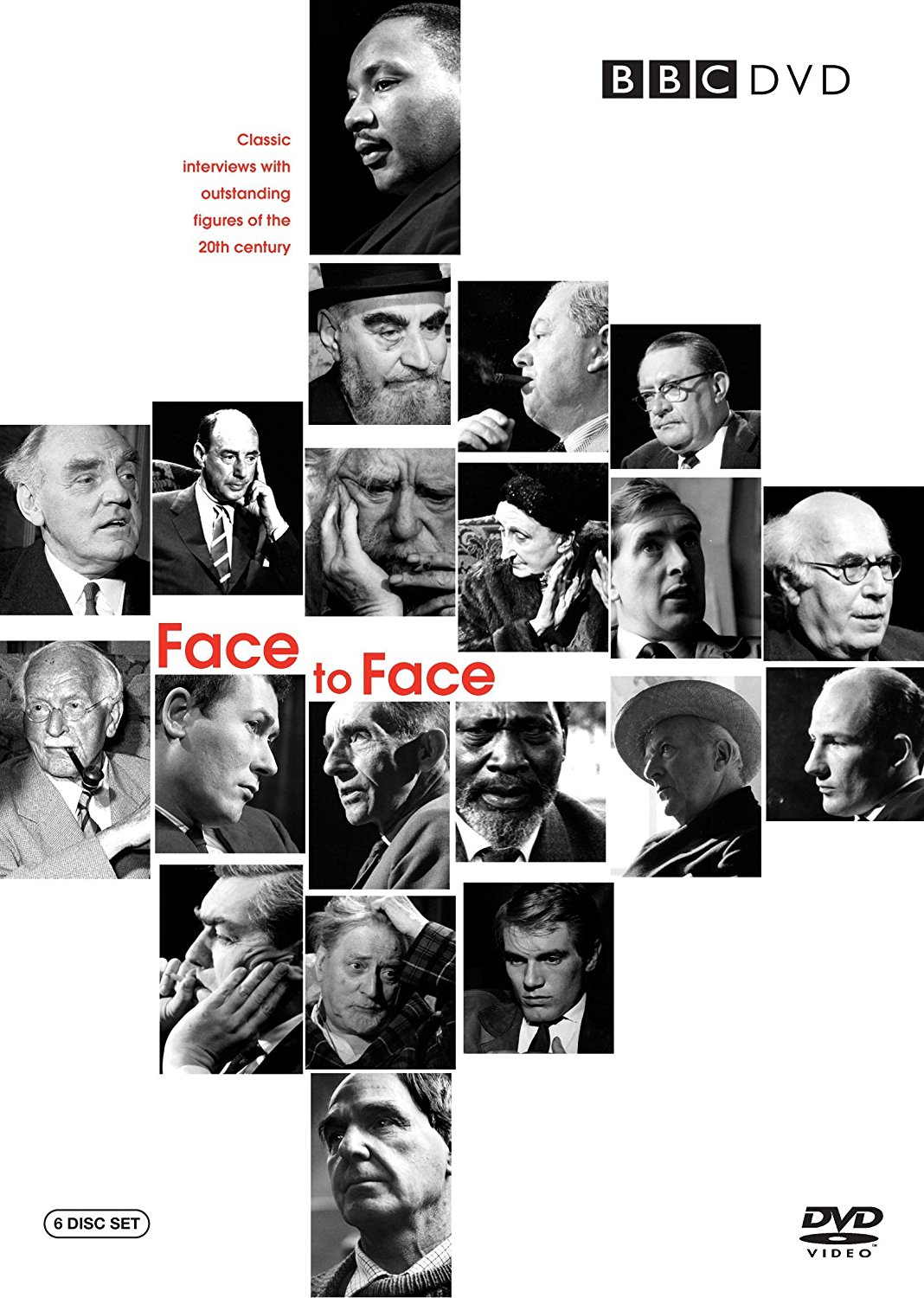
Photo:IMDb
‘Bertrand Russell, the great British philosopher and social critic, appeared on the BBC programme ‘Face-to-Face’ in 1959 and was asked a closing question: ‘What would you tell a generation living 1,000 years from now about the life you’ve lived and the lessons you’ve learned’. His answer is short, but pithy.
I should like to say two things, one intellectual and one moral:
The intellectual thing I should want to say to them is this: When you are studying any matter or considering any philosophy, ask yourself only what are the facts and what is the truth that the facts bear out. Never let yourself be diverted either by what you wish to believe or by what you think would have beneficial social effects if it were believed, but look only and solely at what are the facts. That is the intellectual thing that I should wish to say.
The moral thing I should wish to say to them is very simple. I should say: Love is wise, hatred is foolish. In this world, which is getting more and more closely interconnected, we have to learn to tolerate each other. We have to learn to put up with the fact that some people say things that we don’t like. We can only live together in that way, and if we are to live together and not die together we must learn a kind of charity and a kind of tolerance which is absolutely vital to the continuation of human life on this planet.’- Excerpts from Open Culture
See also: Three Passions of Bertrand Russell (and a Collection of Free Texts)
Bertrand Russell - Message To Future Generations - YouTube--Watch the Video HERE
......
See a selection of related articles from the GCGI Archives
The symphony of life is all about love and loving, inspiring peace, justice, fairness and the hope for a better life.
All my life I have had the choice of love or hate. I chose love.
When I chose hate, I suffered pain and anguish.
When I chose love, I flourished and found peace and contentment.
Bertrand Russell's 10 lessons for a creative, happy life
Why Love, Trust, Respect and Gratitude Trumps Economics
Today is World Kindness Day: Embracing Kindness to Defeat the Political Economy of Hatred
The man who taught me about war and peace, hatred and love, despair and hope
- Details
- Written by: Kamran Mofid
- Hits: 1154
Brexit: The Path to Tyranny and the loss of Moral and Spiritual Compass
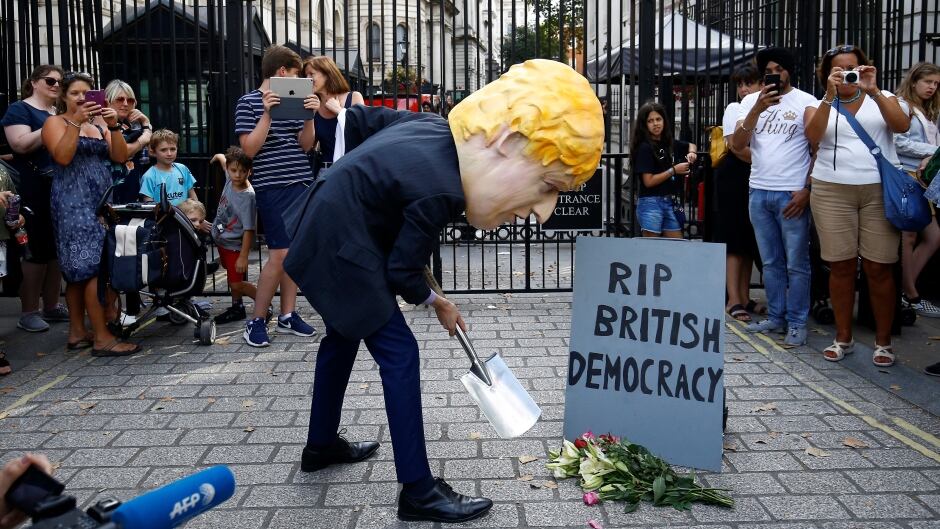
Photo: CBC
Lord Neuberger: ‘Once you deprive people of the right to go to court to challenge the government,
you are in a dictatorship, you are in a tyranny.’
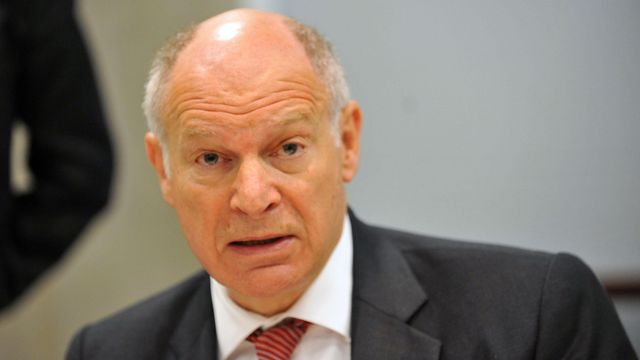
Photo: The New European
Lord David Edmond Neuberger (pictured above) was the former president of
the supreme court of the United Kingdom.
‘The government’s Brexit strategy is in danger of driving the UK down a “very slippery slope” towards “dictatorship” or “tyranny”, according to a former president of the supreme court.*
Addressing an online meeting of lawyers, Lord Neuberger on Wednesday evening condemned the internal market bill, which enables the government to breach international law and exempts some of its powers from legal challenge.
“Once you deprive people of the right to go to court to challenge the government, you are in a dictatorship, you are in a tyranny,” Neuberger told the webinar. “The right of litigants to go to court to protect their rights and ensure that the government complies with its legal obligation is fundamental to any system … You could be going down a very slippery slope.”
His comments came as the Scottish parliament at Holyrood voted by 90 votes to 28 against granting legislative consent to the Westminster bill. The Scottish National party, Labour, Green and Liberal Democrat MSPs united to oppose the legislation; only Conservative MSPs supported it.
The vote will not prevent Boris Johnson’s government at Westminster from pushing through the internal market bill, but the Scottish constitution secretary, Mike Russell, said the Scottish parliament had “explicitly” and comprehensively rejected it.
The hastily assembled online panel opposing the bill, organised by the International Bar Association, included Lord Neuberger, the former home secretary and Conservative party leader Michael Howard, the former attorney general Dominic Grieve QC, the SNP justice spokesperson Joanna Cherry QC, Helena Kennedy QC and Jessica Simor QC.
All hoped the internal market bill would be defeated in parliament – overturned and fatally delayed by the House of Lords – rather than being challenged in the courts.
Cherry said she feared it would end up in the courts and the Scottish government might itself have to initiate legal proceedings against the Westminster government.
Neuberger warned that any hearing would “put the judges in a position where they are on a collision course with the government or are seen to be craven … [But] you have to sort out problems in court, if you don’t you have a civil war.”
Lord Howard told the online rally, which attracted more than a thousand participants, that he was “opposed to the clauses in the bill which breach international law”.
“I’m opposed because I think governments ought to keep their word and uphold treaties,” he said. “I hope this bill is defeated in parliament not in the courts.”
Grieve said not only did the bill breach international law, it contained an “ouster clause which goes to the heart of parliamentary democracy”, preventing the government being challenged over its actions. Rather than Brexit being “an assertion of sovereignty,” Grieve added, “it constitutes its undermining”.
*The above report by Owen Bowcott was first published in The Guardian on 7 October 2020
Brexit strategy risks UK 'dictatorship', says ex-president of supreme court: Watch the Video
......
The Anglican church has publicly challenged the government’s
willingness to break international law over Brexit

Justin Welby, the archbishop of Canterbury, is among the signatories to a letter stressing the
importance of the Good Friday agreement. Photo: The Guardian
'The UK’s archbishops chastised the government over Brexit. In a rare move, Britain’s five Anglican church leaders publicly warned of the “moral, as well as political and legal, consequences” of the government’s willingness to break international law by passing a bill that would override parts of the existing UK-EU withdrawal agreement.'-- UK archbishops urge ministers not to breach international law over Brexit
……
UK needs judges to limit government power, says Lord Kerr
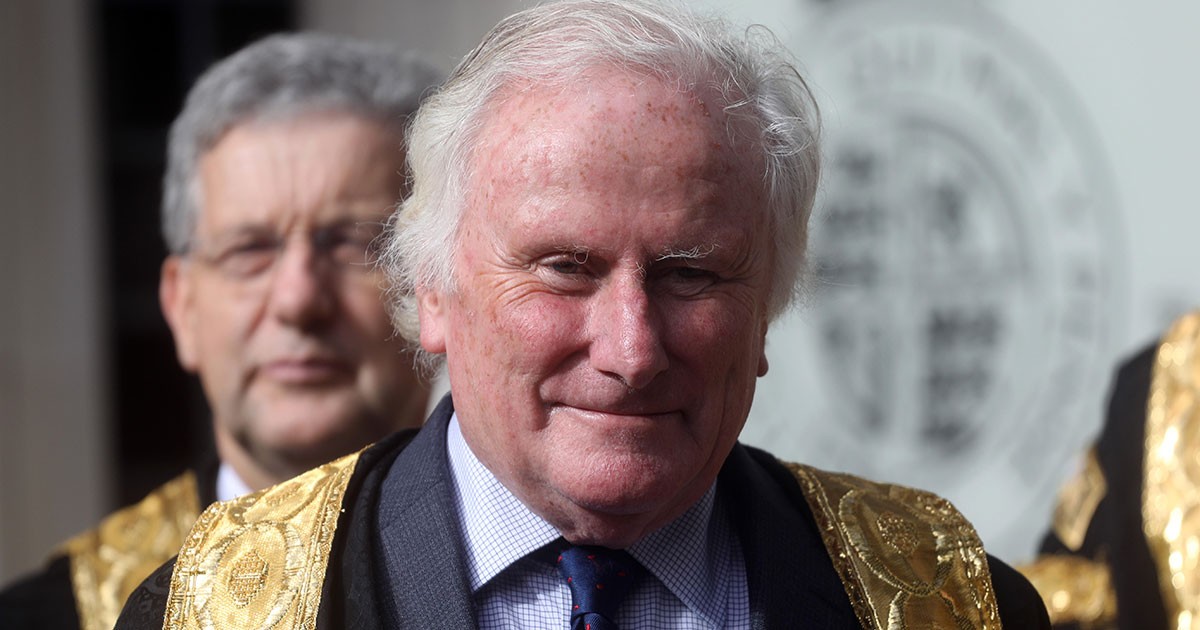
Photo: Pinterest
Longest-serving supreme court justice says healthy democracy requires checks on ministers
‘The last thing the country needs is a government in which ministers exercise “unbridled power”, the UK’s longest serving supreme court justice has said.
In a forthright defence of the courts system, Lord Kerr of Tonaghmore, who stood down at the end of last month, said judicial checks on the government were part of a healthy democracy…’- Continue to read
……
'Patriotism' is the last refuge of a scandalous government
'The kind of war talk that helped get Brexit done is now proving useful
in managing No 10’s calamitous Covid strategy.'
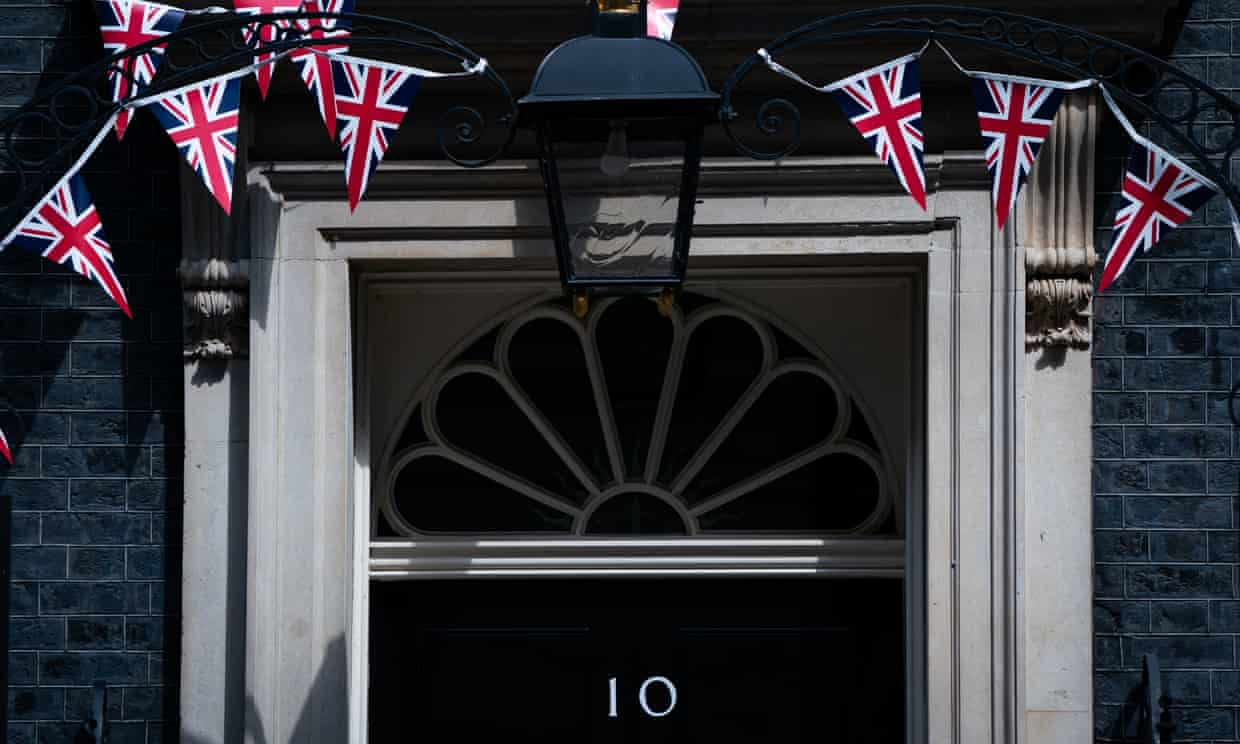
‘A party that governs in the national interest does not hand out large untendered contracts to
the private sector, or barricade itself against the north of the country.’-Photo: The Guardian
‘Consider this rule of thumb: the more that “patriotism” is invoked by a country’s political elites, the less healthy its political culture will be. From McCarthyism in the US to the Chinese Cultural Revolution, the imperative to love one’s country has often been used as a pretext for persecution and submission. And in post-Brexit pandemic Britain, we have developed our own grammar of patriotic intimidation.
The Conservative government is well positioned to play this game. It is already high on the fumes of Brexit, which carried the Tories to a majority that would allow them to vanquish Europe, take back control and get the job done. The Vote Leave veterans in No 10 are already aware of how well the language of treachery and sabotage can turn a section of the public against its own judiciary and even elected representatives. The kind of war talk that helped secure Brexit is now proving useful in managing the government’s calamitous Covid strategy…’- Continue to read
......
'A HARD RAIN'
Driven and Fueled by the Lies of the Past-
‘Johnson, Gove and Cummings Drive Britain Towards Elective Dictatorship.’
The Posh Boys Destroying this Green and Pleasant Land

A poster in Kentish Town, north London, mocks Michael Gove, Dominic Cummings
and Boris Johnson. Photo: Tolga Akmen, via The Guardian
‘Britain is changing from a parliamentary democracy towards an elective dictatorship faster than people realise after Boris Johnson’s election victory.
The announcement that Sir Mark Sedwill, the Cabinet Secretary and National Security Advisor, has quit is the most high profile indicator of a revolution that will be sweeping through Whitehall, Parliament and the courts over the next four years if Johnson, Michael Gove and Dominic Cummings get their way.
Sir Mark will have to be replaced, under Civil Service Commission rules, by another permanent or former permanent secretary – but the new National Security Advisor, David Frost, is currently leading the Brexit negotiations with the EU and is a committed Brexiter and darling of the Vote Leave movement.
Last week, the Prime Minister’s controversial chief advisor Cummings was reported to have warned that a “hard rain” would soon fall on the Civil Service.
What has not been noticed is that the vast majority of new Whitehall appointments are now going to business and data experts – part of Cummings’ revolution to bring in ‘disruptors’ and, in his words, “weirdos and misfits” into the heart of Whitehall.
The search for a new permanent secretary for the Department for Business, Energy and Industrial Strategy (BEIS) already involves a New York recruitment agency, Russell Reynolds, which states on its website: “The organisations that don’t disrupt themselves are the ones that will be disrupted...”-Continue to read
......
See a selection of related articles from the GCGI Archives:
So, They Got Their Brexit Done!
The Disintegration of this Disunited Kingdom- Canon Dr Paul Oestreicher
THIS ENGLISH BREXIT- Canon Dr Paul Oestreicher
Britain today and the Bankruptcy of Ideas, Vision and Values-less Education
How a dangerous belief in British exceptionalism led the UK to ruin
British exceptionalism has reached the end of the road
......
After Boris Johnson’s COVID-19 recovery and discharge from hospital, I wrote him a public letter, pleading with him to change his ways and become A Man For The Common Good. As it happened, it was, nothing, but a wishful thinking on my part! He proved to me that, yes, indeed, leopards can never change their spots!
Dear prime minister now with your future actions you can prove, once and for all, that, yes, indeed, leopards can change their spots, and a man like you, can change his character and innate nature.
Boris for the Common Good! How miraculous that can be! God must have saved you for something good!
......
...and thus, he went on and gave us our long-awaited ‘Independence Day’, freeing us from tyranny, dictatorship, and colonisation!
The ‘Independence Day’, Not Long to Go!

- Details
- Written by: Kamran Mofid
- Hits: 1111
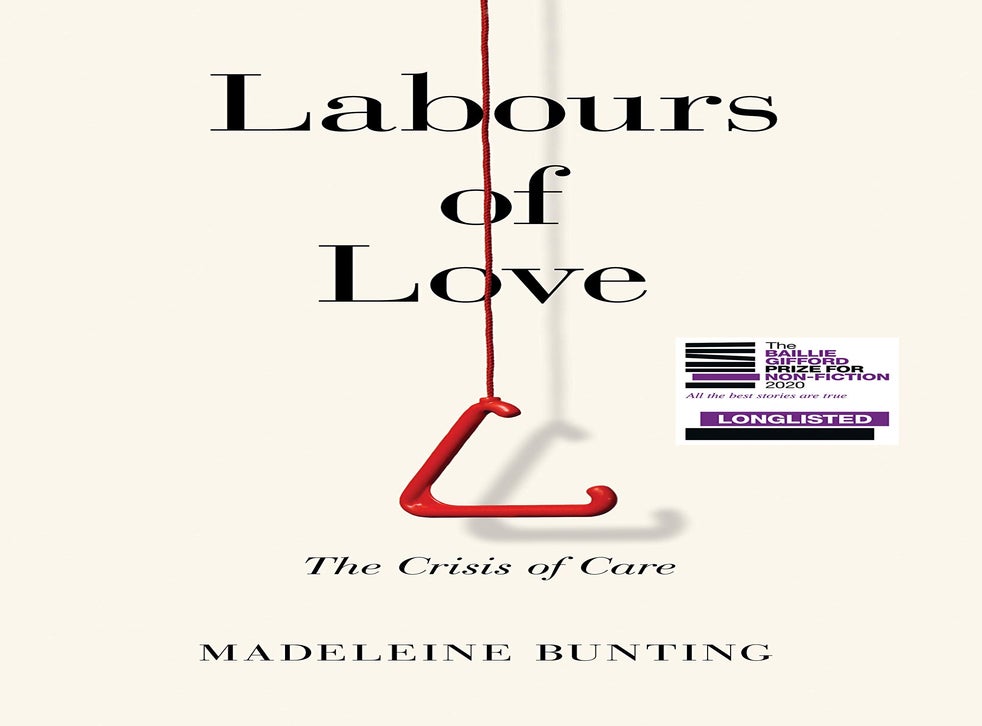
Photo: The Independent
Nota bene
‘A generous heart, kind speech, and a life of service and compassion are the things which renew humanity.’
“As human beings, we will inevitably encounter suffering at some point in our lives. However, we also have evolved very specific social mechanisms to relieve that pain: altruism and compassion.”
“Our poverty in the world is not that of the wallet but rather that of social connectedness.”
......
Kindness is to Care and Caring is to be Kind. Sadly this is what our Values-free World has Forgotten.
To survive and to lead a better, healthier life we need to re-discover the values we once knew and held dear!
Think about it, we may all get sick, we will all get old, weak and vulnerable. We will all need love, support, empathy, caring and humanity.
It is, thus, incumbent on us, to find out more on why and how there is this pandemic crisis in Caring in the world and how it may be reversed.
We must all know what it means to be human.
The Tragedy of Health and Social Care Failings in our Privatised and Monetised World

Photo: The Guardian
And moreover:
In the process of privatisation, marketisation, highest returns to the shareholders, largest bonuses to the CEOs and outsourcing our responsibilities, we have now realised that we have also outsourced our humanity and our humane values.
Is this not the time yet to rethink our broken and inhumane neoliberalised, privatised and deregulated market economy and education model?
......
Covid shows why care is in crisis: we have crushed the humanity out of it*
By Madeleine Bunting
‘What I discovered, in five years of research, was a vital activity distorted by
a desire for tickbox efficiency and value for money.’

Photo: The Independent
‘Care is a short word that is ubiquitous, used for the most intimate relationships with vulnerability and dependence from birth to death. Fired by curiosity, I have hunted out people whose lives are dominated by care, either unpaid or as part of their work. I started every interview with the same question: what do you understand by this word care?
From the 19-year-old social care worker to the experienced GP, from the mother of a child with disabilities to the hospice social worker, from the healthcare assistant to the president of the Royal College of Nursing, I have sat and listened over the last five years to fascinating explanations of this “labour of love” – the words they often used. Many started the interview assuring me they had nothing to say, they were “just” carers. Yet by the end of their deeply moving answers, they were astonished at themselves – and even grateful for having had the chance to explain their work. Several said no one had ever asked before.
I saw how many of these individuals were dedicated to a set of values profoundly at odds with wider society and often even with the organisations for which some of them worked. For instance, the healthcare worker on a busy oncology ward sighed that the hospital management seemed to think it was a business, but she told me she knew it couldn’t be: her work was about relationships. And as I shadowed her for a day, I saw how she patiently coaxed an elderly gentleman to wash and reassured another confused patient. She insisted that even when people are dying, they enjoy a joke and a smiling friendly face. The ward’s other healthcare worker showed me the equipment cupboard, labelled with prices; some of the injections were worth more than a shift’s pay, he commented bitterly.
The sense of being beleaguered was true not just of low-paid healthcare assistants and social care workers, but also of GPs, consultants, professors and directors of nursing. They were just as eloquent and impassioned about the fact that the vital, unquantifiable nature of care was being squeezed to the margins. It’s partly a matter of workload but it’s also a deeper, more systemic shift that has been under way for three decades, in which care is reduced to tick boxes in an attempt to standardise this most unpredictable of human activities.
I could see the resulting tussle of priorities: did the healthcare assistant hurry the elderly gentleman in need of a wash? Did the ward sister race round doing the hourly checks, hurriedly filling out the form – an activity that research has shown is a largely pointless exercise? Care has been routinised and bureaucratised in pursuit of reductions in human error and abuse. That has been combined with a quest for efficiency, productivity and value for money – measures many veterans have long argued are of strictly limited use in the field of care. One wise old hand pointed out that prioritising efficiency over all else is dangerous in two realms of human endeavour: war and care. Needless to say, Covid has made this abundantly clear in the latter case.
This type of managerial control of care has been counterproductive, says Alison Leary, a professor of nursing and a former engineer and mathematician. It generates anxiety, andabuse of patients is thus more likely to emerge.
The medical researcher Paquita de Zuleta argues that neuroscience studies have shown how our capacity for compassion is inhibited in threatening and competitive environments. A director of nursing, who didn’t wish to be named, admitted uncomfortably that recently, when she visited a ward, a junior nurse had jumped up from a bedside and apologised for “just talking”. Reflecting on her own training, she feared that something had changed: “Perhaps we don’t value relationships enough socially and culturally.”
Suddenly, my reading and research into the history of care began to make sense. Never having fully appreciated the importance and complexity of care – too often it has been dismissed as women’s work, simply a matter of instinct – we have distorted this vital human labour into an often grotesque box-ticking parody. At the root of our current crisis lies the historic denigration and misunderstanding of care.
Patriarchy was a system built to ensure the provision of free care. Capitalism ensured care was cheap or free. Novelists didn’t write about it, artists didn’t make it the subject of paintings; care did not feature in the grand traditions of western culture and thought. Economists and philosophers took it for granted. Leary’s generation has struggled to free nursing from the gilded cage of being poorly paid angels, saints and doctors’ handmaidens.
During my research I noticed this profound lack of interest in care. When people asked me what I was working on, my answer would prompt their eyes to glaze over: worthy but dull. I began to doubt the value of spending five years with this short word. What emerged was an ambition to at least provoke some curiosity. That would be a start.
It could begin to re-envisage care as a profound source of meaning and human connection, deeply satisfying and taking multiple forms. One senior IT consultant admitted that after a life of not doing the “caring clucky thing”, she had found caring for her sick husband to be the biggest achievement of her life.
This is the paradigm shift that might mobilise the will and political energy required to tackle the shockingly precarious nature of the care economy we have patched together in the last few decades, which was obvious long before Covid ripped into its many shortcomings. Care visits to people’s own home have been squeezed into absurd units of time, rationed to exclude millions in need, while care homes have been loaded with debt by a private sector in danger of collapse, and home closures have resulted in a postcode lottery of provision. Now Covid has left us haunted by the deaths of more than 19,000 care home residents, and no doubt more to come.
A social revolution in the role of women was left half-finished in the 1980s when my generation of feminists set our sights on the workplace, and men failed to step up in sufficient numbers to take on a share of care. Jobs such as care workers and nurses are still predominantly done by women. We might shift the dial if a fraction of the energy and attention of the MeToo movement focused on the crisis of care. It’s analogous to the environmental emergency, only in this crisis the natural resource that is being destroyed or commodified is human relationships and compassion. Capitalism seeks to quantify and extract value, and when such disciplines are applied to the care worker, it is a tragedy. Because what is at stake is the reciprocity of human hearts, the need for comfort, and our innate human capacity to nurture wellbeing and ease suffering.’
*This article by Madeleine Bunting was first published in The Guardian on 15 October 2020.
Madeleine Bunting is an author. Her latest book is Labours of Love, the Crisis of Care
......
Labours of Love: A Humbling Book about Care
'Care, paid and unpaid, is at the heart of society, now more than ever ... this is a moving and absorbing in-depth investigation'
‘The marketisation of care treats it as a product. “Care packages” are “delivered”; satisfaction questionnaires are ubiquitous – nurses are accused of not showing enough “empathy”. “Convenience” and “availability” become the mantras; GP surgeries, open seven days a week, are now a “service industry”. As society has become more medicalised, a consumer mentality encourages the sense of entitlement: a patient clicks her fingers at the nurse to get attention.’
…’What “care” means is a vast subject. It happens everywhere. In the daily maintenance of life in homes and families and in public institutions or social organisations imbued with their own histories and traditions. It is at once deeply intimate and profoundly cultural. Paid or unpaid, the quality of care in our lives is nothing less than sociality itself: it is an index of how we survive as a society and a species. It tells us the value we place on human life.
These essential, existential questions are at the heart of Labours of Love. Madeleine Bunting’s book could easily have become either a furious polemic or a vale of tears. It is neither, though it is angry and very moving. She meant it as a warning in the face of “a crisis of unprecedented proportions” in the provision of health and social care across the UK. With the advent of the coronavirus, its eloquent plea for change has become even more urgent.’...-Continue to read
……
My Ten Steps to Build a Fairer and more Caring World for the Good of All
- How to Lead With Emotional Intelligence and Emotional Education for a Fulfilling Life
- The Last Persian Prince of Poetry: The Living Legacy of Malek o' Shoara Bahar
- My Poem of the month (October): MORḠ-E SAḤAR (Bird of Dawn)
- 'Creation Is Groaning!': A Wake-up Call
- Fraternity, Social Friendship, the Common Good, Seeking what is Morally Good
